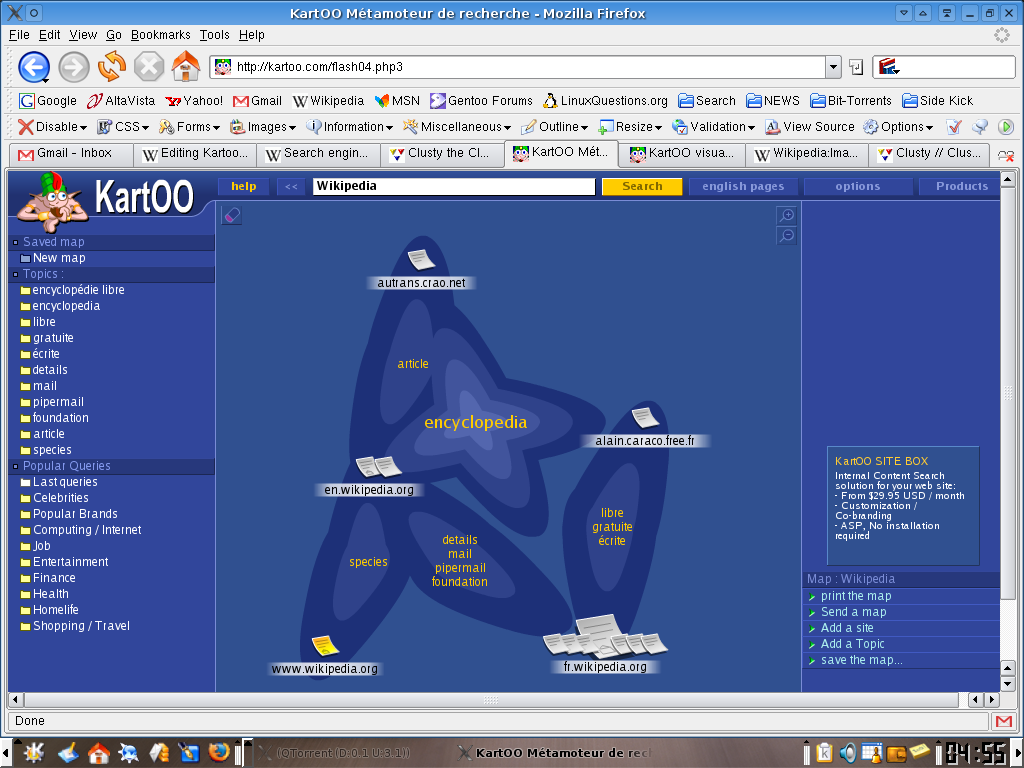"I wisely started with a map..."
"Mapping is fundamental to the process of lending order to the world."
1Kartoo was a cartographic, visual meta-search engine, that operated for a [too] short period (2001-2010). It offered a ‘network metaphor’ to present search results acquired from external engines. Kartoo’s Macromedia Flash [R.I.P.] interface could resemble a ‘topographic’ view of linked map nodes (=sites), suggesting various relationships between them2.
The topographic interface proposed possible ‘paths’, following information associations and proximities, as such were derived from [parametrized] search data3.
Bygones lamentations aside, there was a very visually appealing lesson in this brave endeavor: It had implied, that information pieces are not “sequential”4; knowledge has structured configurations, agglomerations, or formations, with clusters and focal interest points interlinked and interwoven to create subject matter’s scope or domain context. Sometimes there are also information ‘islands’, disconnected from other spanned subsets; one might be digging in the wrong ‘area’…
All this was not new then, and remains true today:
Researching for an academic assignment, for example, would have included for visiting the library in search of information5. That process might have started by browsing through a catalogue, consulting an omniscient librarian, following syllabus pointers…It then turned to piling the sources [or the photocopied pages from], reading, rereading, comparing, summarizing, discussing, asking questions, building ideas, discarding lesser or unviable ones, going back to read that which was misread or misunderstood…
Similar exploratory information elicitation and collection serve any effort, which aims at gaining understanding and insight into a knowledge domain.
Then, one could actually see [and feel the weight of] data agglomerations and information foci. Building the body of the research, developing ideas based on these data, were processes bound to and based on links, linkages, references, contexts, and sometimes—original hops from one idea to another, in a way no one thought of before!
This observed sense applies to project management and process betterment, as well.
When product teams attempt improving any aspect of their operations, they should better avoid narrowing down the scope of their inspection; e.g.—while performing a Root Cause Analysis6, the team should better cast a wide[r] net and open [or draw] a map rather than gather under the lamppost…
…which might be not…that…safe…
The title is attributed to J. R. R. Tolkien, the subtitle to Robert A. Rundstrom.
There was some criticism at the time on the ‘exactness’ of the recommended links; however, as with any other reference and lookup tool—the quality of the search and the effectivity of the process relied to a large extent on the user.
Back then, I had an idea to pursue Operations Research-like methods to seek an ‘optimal’ search target. Unfortunately [or luckily]—Kartoo had retired before I could do much about it…[…sigh…]
…like a search engine’s long, toilet-paper-like result sets…
Yes, I know this is still going on; I’m trying to be a little dramatic here, OK…?
More on RCA—in other related posts here.




